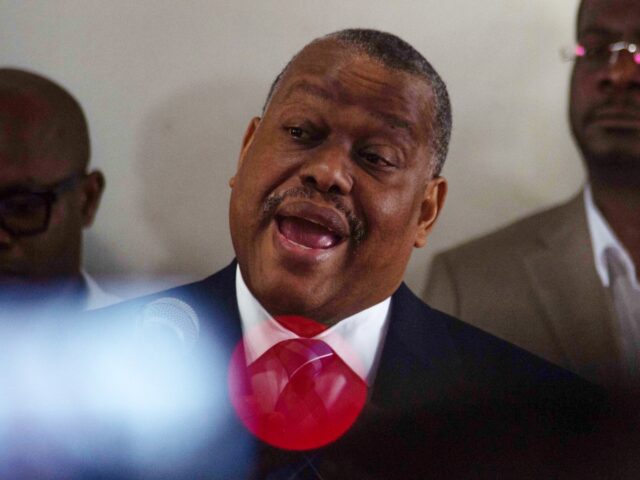Acting Haitian Prime Minister Garry Conille said Tuesday his government has received only a fraction of the funding and manpower promised by the international community to fight back against the gangs that have violently taken control over most of the country.
“We’re doing this with absolutely nothing. We need help,” Conille told the Wall Street Journal (WSJ).
“The situation is the worst I’ve seen in my entire lifetime. This is really urban warfare at its worst. It’s a few thousand people holding 12 million people hostage,” he said.
Conille said establishing physical security on the streets was essential before any other aspect of Haiti’s dire situation could be improved. He complained the international community has come up very short on its promises to help him restore order.
The 400 Kenyan police officers who were supposed to be the vanguard of a 2,500-strong peacekeeping force are, to date, the only boots that have hit the Haitian ground. Only a small portion of the $600 million pledged to train and equip more Haitian police has been furnished to date, most of it coming from the United States and Canada. Conille said he has been given few details about when the rest of the men, material, and money will arrive.
The WSJ noted that Conille has invested considerable personal effort in attempting to stabilize Haiti, which at this point look less like a nation-state with a bad crime problem and more like a ravaged country trying to repel an invasion by barbarian tribes. Gang leaders in Haiti resemble warlords of old, setting laws for their conquered city districts and dispatching swarms of thugs to enforce their commands.
Conille, 58, was unanimously appointed interim prime minister by Haiti’s transitional council in May 2024, following the reluctant resignation of unelected Prime Minister Ariel Henry. The transitional council has vague plans to hold an election sometime next year, assuming the security situation improves.
The council hoped Conille’s professional credentials and international resume – he is a medical doctor, former UNICEF director, successful coordinator of reconstruction after the devastating 2010 earthquake in Haiti, and was briefly prime minister in 2011 – would help to attract more international assistance. His appointment as interim prime minister was, not coincidentally, made right before those 400 Kenyan police arrived.
Conille personally joined police patrols of gang-controlled districts and made a surprise trip to the United States in June to plead for more funding. Unfortunately, he suffers from asthma, and was briefly hospitalized with respiratory issues when he returned from the United States. He still makes personal visits to locations around Port-au-Prince, and gunfire has been heard during some of those visits.
In addition to the gang menace, Conille told the WSJ he is still wrestling with corruption in what remains of the Haitian government, including bank scams and drug trafficking allegations. The U.S. Treasury Department has begun dropping targeted sanctions against dodgy Haitian officials like warning shots to keep them away from Conille’s fledgling government.
The Haitian Times in July gave Conille high marks for his first month in office, although the paper was less enthusiastic about the transitional council, which has been considerably less dynamic than the prime minister. Also, despite Conille’s visible and personal efforts to push back against the gangs, the Haitian Times sadly concluded gangsters still controlled far more of Port-au-Prince than its government.
The big problem is that all regional parties, very much including the U.S. government, are still reluctant to pour money into the chaos and corruption of Haiti, and no one wants to put boots on the ground in a quagmire. The WSJ interview with Conille included a darkly comical account of Haitian police frantically trying to tell their Kenyan colleagues to stay out of unsafe neighborhoods while shots rang out around them.
Kenya is probably tapped out for manpower after sending its first squad of police officers to Haiti. Even that small deployment was challenged in court by the Kenyan political opposition.
Both Haitian civilians and gangsters have noticed the Kenyans have not done much to establish order or recapture a single city block from the warlords. The Kenyan officers complain they are under-equipped and underpaid for their hazardous duty. Promised bonuses for working overseas have been delayed for weeks, and when some bonus checks finally started to arrive, they were only about half of the $1500 that was promised.
Ongoing political unrest in Kenya makes it unlikely that more of its security forces will be sent to Haiti. No one else is stepping up to the plate, so the Biden-Harris administration is reportedly planning to persuade the United Nations to take over with a traditional peacekeeping operation.
The history of U.N. peacekeeping operations in Haiti is not encouraging, to say the least, and even if the rest of the U.N. Security Council is willing to go along with the proposal, Russia and/or China could easily embarrass the administration by vetoing it. The propaganda value of keeping Haiti festering as a hideous human rights crisis in America’s backyard might be hard for either of the rising authoritarian powers to resist.
“A traditional U.N. peacekeeping operation would end the mission’s problems with funding, because it would be paid for through member nations’ traditionally assessed contributions. It would also provide more equipment like helicopters, which the current Kenya-led mission lacks, and possibly a hospital capable of performing surgeries,” the Miami Herald reported on Wednesday.
“Also the U.N. would be able to mobilize military forces, rather than just cops, from other nations in a way that the U.S. has been unable to do,” the report added.

COMMENTS
Please let us know if you're having issues with commenting.